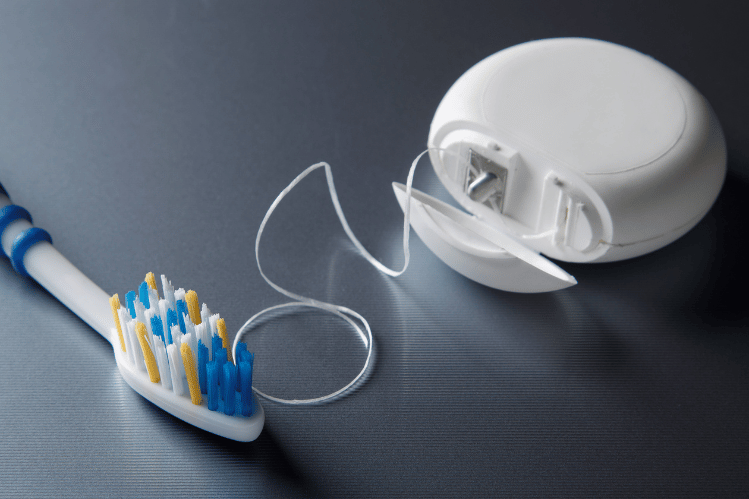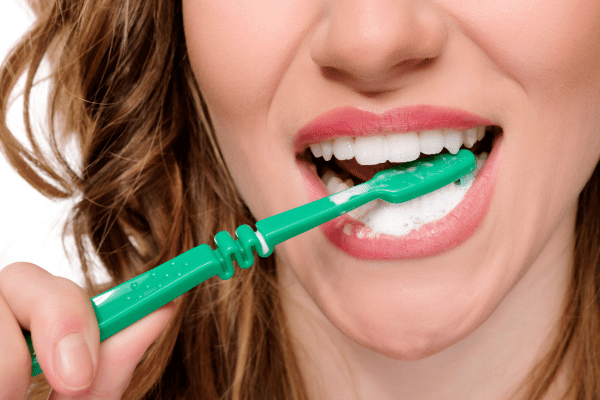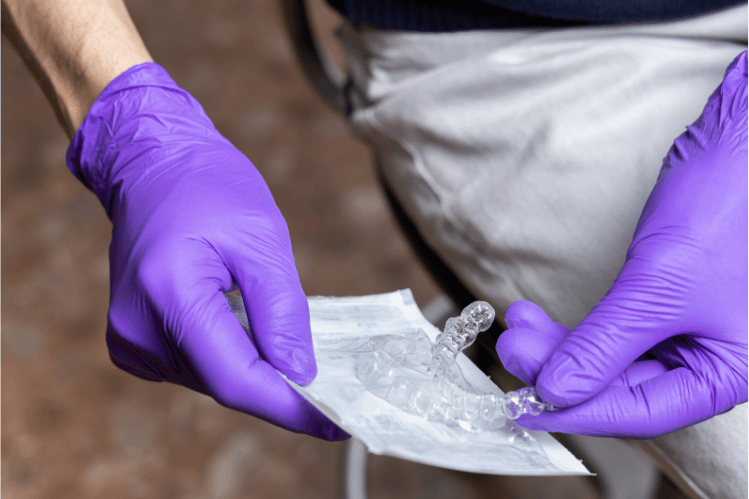
Table of contents
-
Should I Floss or Brush My Teeth First?
-
Which should you do first: Floss or Brush?
-
Flossing First: An Innovative Approach to Oral Hygiene
-
The Significance of Flossing and Brushing
-
Expert Advice for Effective Tooth Brushing
-
Angle Your Brush
-
Individual Attention
-
Apply Light Pressure
-
Transform Your Start
-
Comprehensive Method
-
Maintain Hygiene
-
Flossing: Advice for Optimal Dental Health
-
The Importance of Flossing in Relation to Orthodontics
-
Target Hidden Areas
-
Prevent Gum Disease
-
Maintain Tooth Enamel
-
Minimize Bad Breath
-
Maintain Your General Oral Health
-
Conclusion
You are aware by now that maintaining good oral health requires a dental hygiene routine that includes brushing and flossing. However, have you ever thought about whether you need to floss or brush your teeth first? Does it really matter in the end? Although people have debated the merits of both approaches, recent studies indicate that flossing first is the clear winner.
Which should you do first: Floss or Brush?
The ordinary person will probably give you a variety of responses and arguments for why they think their method is the best if you ask them whether they brush or floss first. The most common sequence that people follow is typically flossing following brushing.
They often brush their teeth first thing in the morning and last thing at night before flossing. Sadly, a lot of people just forget to floss after brushing, saying that it takes too much time and they don't want to make the effort.
According to research, only thirty percent of people actually floss daily, with another thirty-seven percent indicating that they do so very occasionally and thirty-two percent admitting they never do so.
Flossing First: An Innovative Approach to Oral Hygiene
Time-Selection Technique
Many people choose to floss instead of brushing because they find it to be more time-consuming. When flossing is put off until after brushing, it is frequently forgotten.

Platter-Busting Advantages
Plaque is first broken up between teeth by flossing, making it easier to remove while cleaning. Research supports this method, one of which was published in the Journal of Periodontology in 2018. Enamel health is promoted by lowering interdental plaque and increasing fluoride concentration.
Thorough Cleaning
Plaque, food particles, and bacteria that brushing alone cannot remove are first removed by flossing. This treats halitosis, lessens the chance of ingesting plaque, and soothes irritated gums. It's a preventative measure to keep your mouth healthy generally and prevent gum disease.
The Significance of Flossing and Brushing
It's clear that brushing and flossing are essential for maintaining good dental health now that we know which is better. Making the most of your brushing and flossing techniques can help you take the best possible care of your teeth and gums.
In this section, we provide some advice on how to maximize the benefits of brushing and flossing.
Expert Advice for Effective Tooth Brushing
According to the American Dental Association, you should wash your teeth for at least two minutes, twice a day. Your toothbrush is the best place to start when it comes to dental brushing advice. The toothbrush you use ought to fit your mouth properly and have gentle bristles. You should use a toothbrush small enough so that you can reach the front, rear, and tops of every tooth. Other toothbrushing advice is as follows:

Angle Your Brush
To guarantee that your teeth and gums are thoroughly cleaned, hold your toothbrush at a 45-degree angle.
Individual Attention
Use tiny, circular, up-and-down strokes to thoroughly clean every tooth, paying attention to all surfaces.
Apply Light Pressure
Don't use too much force because it can damage your gums. To effectively clean without causing damage, apply light pressure.
Transform Your Start
Every time you brush, switch up which tooth you start with to give every tooth the same level of attention. This method encourages thorough cleaning and stops certain areas from being neglected.
Comprehensive Method
Pay attention to the tongue and gums as well as the tooth surfaces, as these areas are common hubs for the growth of bacteria.
Maintain Hygiene
To avoid bacterial buildup, keep your toothbrush clean and replace it every three months. For best cleaning, rinse your brush after using it and store it upright in a closed container.
Flossing: Advice for Optimal Dental Health
Although many people consider flossing to be a chore, it is actually an essential part of a proper dental hygiene routine and oral health. Furthermore, it doesn't have to be as hard as you would imagine. Among the flossing advice are:
Discover Your Fit
Choose from a variety of floss varieties, including waxed and unwaxed, to fit your needs. A more comfortable and successful flossing experience is ensured by choosing the floss that best suits your needs.
Beyond Conventional Floss
Traditional string floss isn't the only dental hygiene tool available. Accept alternatives such as water or pressured air-powered oral irrigators for thorough cleaning in between your teeth, or disposable dental picks and electric flossers.
Develop Your Skills
Develop Your Methodology
Getting the hang of flossing correctly is essential to effectively removing tartar and plaque. Make sure the floss touches the tooth surfaces but stays away from the gum line by gently gliding it up and down.
The Importance of Flossing in Relation to Orthodontics
Curious if flossing is crucial during orthodontic treatment? Absolutely! Maintaining strict oral hygiene is key to avoiding dental problems. Orthodontic instruments may create hard-to-reach spots where plaque can accumulate, leading to issues like cavities and gum disease. Flossing is vital, especially with orthodontic gear, for optimal dental health.
Target Hidden Areas
Using a toothbrush alone is sometimes insufficient to clean the many tiny areas that are created by braces, aligners, and other orthodontic products. By reaching these hard-to-reach areas, flossing helps reduce the chance of plaque accumulation.
Prevent Gum Disease
Gingivitis, the initial stage of gum disease, can be brought on by accumulated plaque between teeth and along the gum line. Frequent flossing aids in the early prevention of this illness by reducing plaque buildup.
Maintain Tooth Enamel
Tartar and plaque can destroy your teeth's enamel. Flossing removes this plaque and its hazardous hidden particles and bacteria, which helps to preserve enamel.
Minimize Bad Breath
Persistent bad breath can be caused by food particles being trapped in orthodontic gear. Flossing helps to keep your breath fresh by helping to remove these particles.
Maintain Your General Oral Health
Cavities, mouth sores, and even more serious illnesses like periodontal disease can result from poor dental hygiene. Thorough oral care is achieved by combining brushing and flossing on a regular basis.
Conclusion
Ultimately, there might not be a clear-cut solution to the age-old debate over which is better—brushing or flossing first. In the end, what matters most is that you are including both in your regular dental hygiene routine. Thus, feel free to try different things until you find what works best for you. A healthy smile is always worthwhile!
FAQs
It's a matter of taste. While some people like to brush first to loosen plaque, others prefer to floss first to remove debris. The secret is to be consistent!
Remain calm! Just remember to floss later in the day to keep your oral health at its best.
For good dental health, both are necessary. The most important aspects of your dental routine are thoroughness and regularity.
For optimal outcomes, the American Dental Association suggests flossing once a day and brushing twice a day.
Plaque between teeth can be removed with flossing, which lowers the risk of cavities and gum disease. For the best possible dental health, try to include it in your daily routine.




 Australia
Australia New Zealand
New Zealand Malaysia
Malaysia English
English Portuguese
Portuguese English
English English
English English
English English
English English
English Canada
Canada